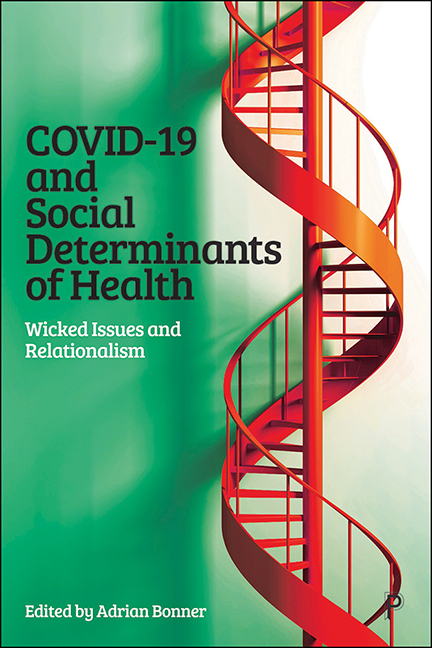Book contents
- Frontmatter
- Miscellaneous Frontmatter
- Contents
- List of figures and tables
- Notes on contributors
- Foreword
- Introduction
- Part I Wicked issues and relationalism
- Part II Regionalism and geopolitical environments
- Part III Public sector, COVID-19 and culture change
- Part IV The third sector
- Part V The case for relationalism
- Part VI Engagement and proposed changes
- Conclusion
- Appendix The Centre for Partnering
- Index
1 - Using relationalism to navigate wicked issues: investing for a ‘relational dividend’?
Published online by Cambridge University Press: 18 January 2024
- Frontmatter
- Miscellaneous Frontmatter
- Contents
- List of figures and tables
- Notes on contributors
- Foreword
- Introduction
- Part I Wicked issues and relationalism
- Part II Regionalism and geopolitical environments
- Part III Public sector, COVID-19 and culture change
- Part IV The third sector
- Part V The case for relationalism
- Part VI Engagement and proposed changes
- Conclusion
- Appendix The Centre for Partnering
- Index
Summary
Introduction
In their seminal paper, ‘Dilemmas in a general theory of planning’, Rittel and Webber note that, in response to societal problems:
[A] deep-running current of optimism seems to have been propelling diverse searches for direction-finding instruments [such as] … a clarification of purposes, a redefinition of problems, a re-ordering of priorities to match stated purposes, the design of new kinds of goal-directed actions … and a redistribution of the outputs of governmental programs among the competing publics. [However], by now we are all beginning to realize that one of the most intractable problems is that of defining problems (of knowing what distinguishes an observed condition from a desired condition) and of locating problems (finding where in the complex causal networks the trouble really lies). In turn, and equally intractable, is the problem of identifying the actions that might effectively narrow the gap between what-is and what-ought-to-be. (Rittel and Webber, 1973: 157; emphasis added)
Rittel and Webber’s (1973) notion of ‘direction-finding’ is important. This chapter addresses the ways in which policymakers might seek to both orientate themselves towards policy problems and navigate the actions that might be taken to address them. In another seminal contribution, Lasswell’s (1951) notion of the ‘problem orientation’ identifies ‘the scientific study of problems’ and ‘policymaking around these problems’ as the two ‘poles’ of policy analysis (Turnbull, 2008). Yet, as is widely recognised, phenomena such as bounded rationality (Simon, 1955) and wicked policy problems (Rittel and Webber, 1973) mean that ‘policymakers must often act in the face of irreducible uncertainty – uncertainty that will not go away before a judgment has to be made about what to do, what can be done, what will be done, what ought to be done’ (Hammond, 1996: 11).
The claims of evidence-based policymaking (EBPM) as a means for ‘objective’, technical, evidence-informed choice or ‘policy selection’ tend to lose traction as uncertainty and/or controversy increase (Grint, 2005; Hoppe, 2011). As Turnbull (2008: 73) observes, various objections to the EBPM approach include that it pays insufficient attention to problem framing (for example, Rein and Schon, 1977); presumes an inadequate, univocal definition of social problems (for example, Rose, 1977; Lindblom and Woodhouse, 1993); and excludes the symbolic dimension of policy meanings (for example, Yanow, 1996).
- Type
- Chapter
- Information
- COVID-19 and Social Determinants of HealthWicked Issues and Relationalism, pp. 21 - 40Publisher: Bristol University PressPrint publication year: 2023

